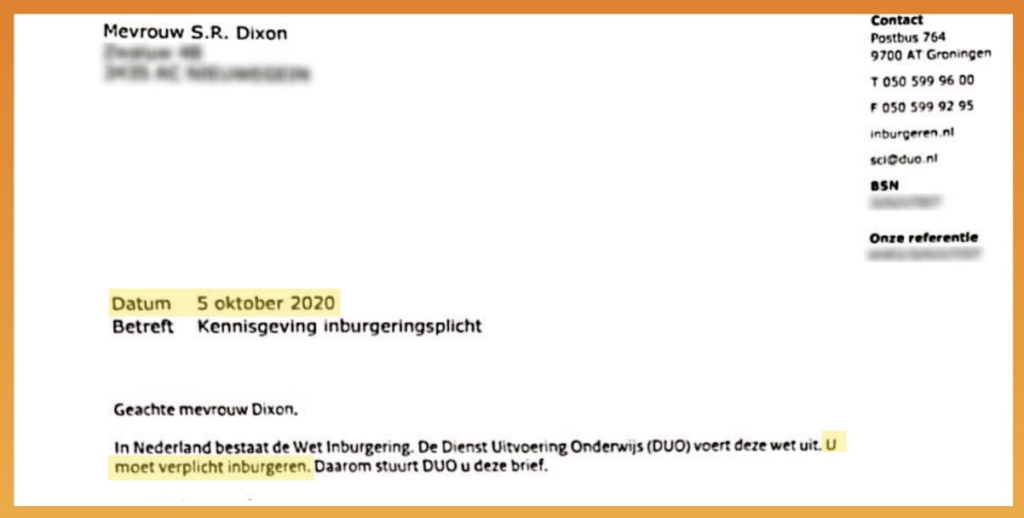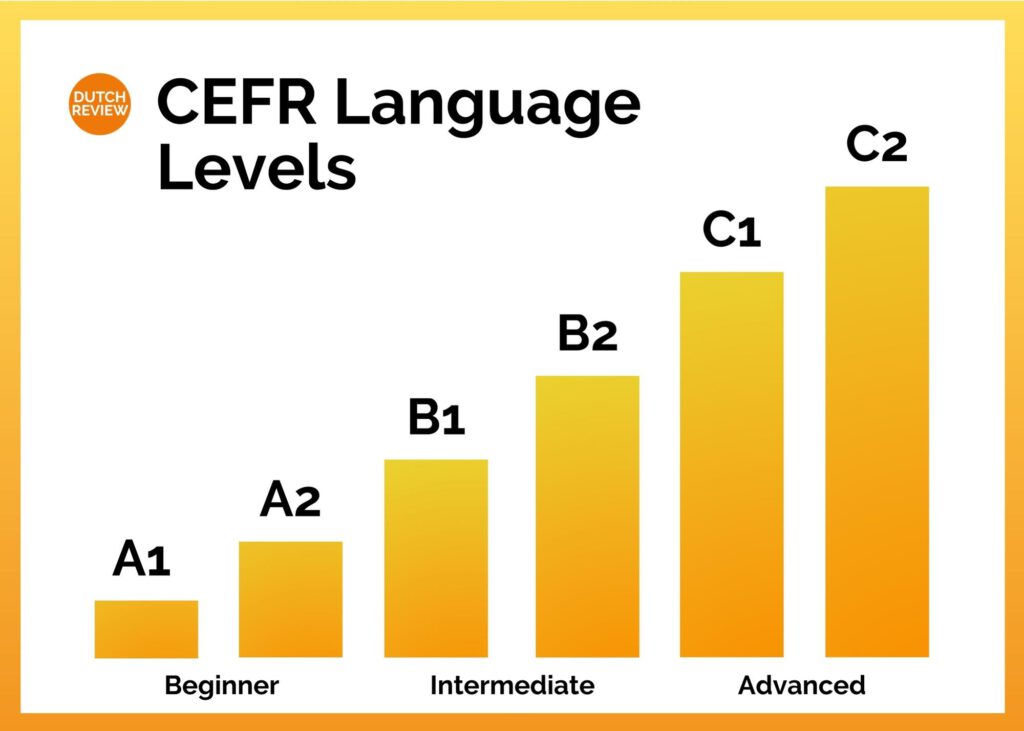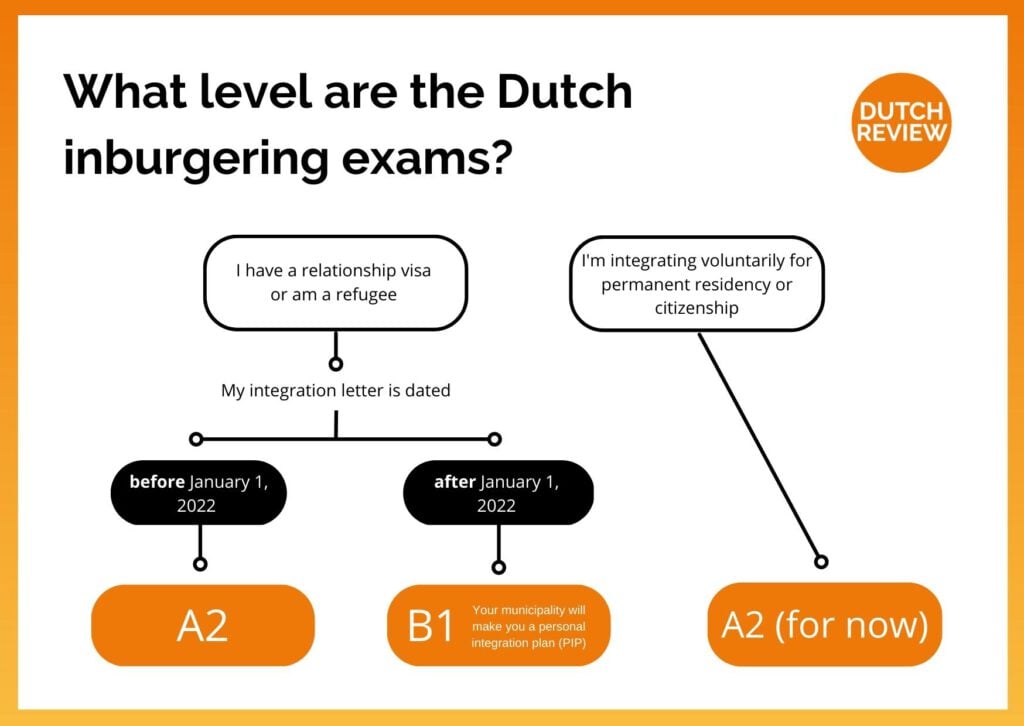If you need to take the Dutch inburgering (integration) exams, congrats! You’re about to go on a whirlwind adventure.
But fear not, young Dutchie-to-be: the inburgering process is challenging but far from impossible.
This guide will explain everything you need to know about the integration exams — from me, Sam, a real person who passed!
Like the integration exams, writing this article required careful preparation, so we were stoked to team up with InburgeringOnline. The courses on InburgeringOnline.nl teach you everything you need to know for the integration exams — affordably and in the comfort of your own home. See the courses.
- 🇳🇱 What is the Dutch inburgering exam?
- 🧍🏻♀️ Who has to take the Dutch inburgering exams?
- ✨ Benefits of taking the Dutch integration exams
- 💰 How much do the Dutch inburgering exams cost?
- 📊 What language level is the Dutch integration exam?
- ✅ Requirements to get the Dutch inburgeringdiploma (integration certificate)
- 🙇♀️ How to prepare for the Dutch inburgering exams
- 🤔 What to expect when attending an exam
- ⭐️ Tips to pass your inburgering exams
- 💯 Receiving the results of your inburgering exams
- 🕣 How long do I have to get my integration certificate in the Netherlands?
- 🚲 What to do after receiving your inburgeringdiploma
- 🙋♀️ The Dutch inburgering exam: frequently asked questions
🇳🇱 What is the Dutch inburgering exam?
The Dutch inburgeringsexamen (integration exams) are a series of tests and tasks required to receive an inburgeringsdiploma (integration certificate).
An integration certificate is often required for people applying for Dutch citizenship or permanent residency.
The entire process is called inburgering (integrating), and at the end, you’ll officially be able to say you are geïntegreerd (integrated) — congratulations! 🎉
The exams, while sometimes frustrating, make a lot of sense. They mean that new permanent residents or citizens in the Netherlands will always have a basic level of Dutch and a good understanding of Dutch society.
You’ll also receive a fancy inburgeringsdiploma to hang on your wall or show random people in the street. Super!
🧍🏻♀️ Who has to take the Dutch inburgering exams?
Some people must take the Dutch inburgering exams. Other people choose to do the exams voluntarily.
You will likely have to take the inburgering exams if you:
- Are in the Netherlands on a relationship visa (compulsory)
- Are in the Netherlands on a refugee visa (compulsory)
- Are in the Netherlands on another visa type but want to become a Permanent Resident (voluntary)
If it is compulsory for you to integrate (for example, because you are on a relationship or refugee visa), you will receive a formal letter advising you so with a deadline.
The deadline to have your inburgering certificate is typically three years from the letter, or three years from signing your integration plan (more on this later). This gives you time to take lessons and prepare.

Who is making me take the exams?
The obligation to integrate in the Netherlands is part of Dutch law — specifically the Wet Inburgering (Integration Law).
Which inburgering law?
It’s important to note that there are two Wet Inburgering: 2013 and 2021. Which law you fall under is determined by when you became obliged to integrate.
- If you became obliged to integrate before January 1, 2021 you come under the 2013 law.
- If you became obliged to integrate on January 1, 2021 or later or are integrating voluntarily, you fall under the 2021 law.
The integration process is covered by DUO (Dienst Uitvoering Onderwijs) or the Dutch Ministry of Education. Through DUO, you can book exams, take practice tests, and (if eligible) take out study loans.
Finally, your local municipality also plays a role. They help create a personal plan for your integration process and are often the first step in your journey towards integrating.
✨ Benefits of taking the Dutch integration exams
Alright, it all sounds like a lot of boring information and exams. But, believe it or not, there are big benefits to the inburgering process, including:
🇳🇱 Speaking, reading, writing, and understanding Dutch
🛂 Being able to apply for a Dutch passport or permanent residency
🚲 Understanding Dutch culture and processes
🎓 The self-satisfaction of knowing you have integrated into a foreign country
💰 How much do the Dutch inburgering exams cost?
Unfortunately, the Dutch integration process is not free. In 2024, you’ll have to cough up the following costs:
| Exam | Cost |
|---|---|
| Writing exam | €50 |
| Reading exam | €50 |
| Listening exam | €50 |
| Reading exam | €50 |
| Knowledge of Dutch Society | €50 |
| Participation Statement | €0 – €150* |
You may also need to pay for study materials, lessons, or to retake the exams if you don’t pass.
*The participation statement is free for people who fall under the 2021 inburgering law. If you were obliged to integrate before January 2021, you might need to pay €150 for the workshop. Some municipalities choose to cover this fee.
Financial assistance for integration in the Netherlands
A bit stunned by the costs (or looking at the price of Dutch lessons?). No problem. It is possible to take a Dutch student loan for the inburgering process.
Most people are eligible for a loan, but you can use loan money only to:
- Pay for the exams, or
- Take a Dutch course at an approved school.
If you borrow money, you have a six-month grace period after integrating before you need to start making repayments. You then have 10 years to pay back the loan.
Not keen on also shelling out hundreds of euros and going into debt for a Dutch school? At InburgeringOnline, you can learn Dutch up to a B1 level for less than €12 a month. Plus, the lessons are entirely online and self-paced. Want to study every day? Once a week? The choice is yours! See the options.
📊 What language level is the Dutch integration exam?
Your inburgering exams can be one of two possible language levels: A2 or B1. This is because the integration law changed in 2021.
Pay careful attention here because your personal circumstances impact to what level you must speak Dutch to integrate.

First, which group do you belong to?
- I am in the Netherlands on an asylum or family reunification (relationship) visa and am required to integrate.
- I am in the Netherlands on a work or other visa and am choosing to integrate to obtain permanent residency.
If you’re in Group 1, skip the next paragraph and read on below.
If you’re in Group 2, congrats! Your language level for the Dutch integration exams is A2 — for now. This could change in the near future, so our advice? Complete your integration process as soon as possible.
Now, for those in Group 1, the biggest question is: When did you receive your letter advising that you must integrate?
If the letter you received advising you to integrate is:
- dated before January 1, 2022, you fall under the old law: your language level will likely be A2. You can book your exams on the inburgeren website.
- dated after January 1, 2022, you fall under the new law: your language level will likely be B1. You’ll need to create an integration plan with your municipality before you can book exams. More on this below.
Of course, this is a complex topic — you can read more about it in our guide to the Dutch integration exam levels.

Creating an integration plan
Under the new integration law, those who become required to integrate after January 1, 2022, must create an integration plan with their municipality.
Here’s what you can expect:
- You’ll receive a letter from DUO stating that you must integrate
- You’ll receive an invitation from your municipality for an intake interview and a short assessment (that you don’t need to study for).
- The municipality will prepare your Personal Integration and Participation plan (PIP), including what language level you need
- You’ll receive another letter from DUO advising you have officially started your integration process.
✅ Requirements to get the Dutch inburgeringdiploma (integration certificate)
To receive an inburgeringdiploma, most people must pass a collection of:
- Dutch language tasks (reading, writing, listening, speaking)
- Culture tasks (a Dutch society exam, a participation workshop, and proof of understanding working in the Netherlands).

What do they involve? Let’s take a look!
Language exams
The Dutch language exams test whether you have achieved a basic level of Dutch. You will have to pass the exam on either an A2 or a B1 level, depending on your personal circumstances (see above if you’re confused about this).
Writing exam (schrijfexamen)
In the writing exam, you will be asked to write short paragraphs based on the scenarios given. For example, you might be asked to write a note to your neighbour to ask them to borrow an item.
Speaking exam (spreekexamen)
The speaking exam lets you show off how well you can praten (talk). The focus here is on grammar, word choice, and pronunciation.
You’ll have to listen to video scenarios and then respond.
Listening exam (luisterexamen)
During the listening exam, you’ll be presented with video clips of different scenarios. You’ll then answer multiple-choice questions about what happened and choose appropriate responses.
Reading exam (leesexamen)
The reading exam tests how well you can understand texts in Dutch.
The majority of the exam consists of being given a short text to read. You must then answer multiple-choice questions about the information given.
Other exams and requirements
Knowledge of Dutch Society (KNM) exam
This exam measures what you know about how things work in the Netherlands. You can expect multiple-choice questions on a variety of topics, including geography, education, going to the doctor, holidays, government and politics, history, and more.
Participatieverklaring Workshop
The Participatieverklaring Workshop is only for those who are on an asylum residence permit or a family reunification permit.
The workshop discusses the values of Dutch society. Things like equality, tolerance, and rights are all discussed. At the end, you sign a document agreeing to uphold those values while living in the Netherlands.
Orientation on the Dutch Labour Market
This exam tests your knowledge of working in the Netherlands. For this, you must prepare a portfolio of work and complete either a final interview or a 64-hour course.
However, only people who became obliged to integrate before 2021 must take this. More importantly, there are exemptions available for people who fall under the 2021 law, like if you have worked in the Netherlands.
🙇♀️ How to prepare for the Dutch inburgering exams
Preparing for the inburgering exams is no easy feat. For the language exams, an A2 level means knowing approximately 2000 Dutch words, while for B1, you need to know over 4000.
Add to that grammar and knowledge of the Dutch society, and you can easily spend anywhere from one to 12 months studying to integrate.
Most people choose to prepare for the integration exams by using a variety of resources: a Dutch school, online preparation programs, textbooks, YouTube, and more.
We recommend starting by building up the fundamentals of the Dutch language. Work towards A1 and A2 Dutch by working through in-person or online courses.
When you’re ready, begin to take the practice exams available on the Inburgering website. These will give you a good indication of what areas you need to work on!
Want to pass the inburgering exams without even needing to step foot in a classroom? Dat kan! At InburgeringOnline, you can learn Dutch all the way from A1 to B2 entirely online, in your own time. Find out more.
Resources to prepare for the Dutch inburgering exams
Ready to get studying? Here are some of the best places to get started:
Websites
- InburgeringOnline: online Dutch courses on your own schedule from beginner level (A0) to B1.
- Inburgeren.nl: the official Dutch government website offers useful official practice exams, but doesn’t offer preparation for the exams.
Textbooks
There are a variety of textbooks available to learn Dutch. You can find some at your local Dutch library (bibliotheek) or in Dutch bookstores. However, most of them are less focused on self-study, and are more designed to be used in Dutch schools with a teacher’s guidance.
However, for the KNM exam, the textbook Welkom in Nederland is considered a great way to study.
YouTube
- Learn Dutch With Kim: a series of grammar and vocabulary videos that explain Dutch in an easy manner.
- Dutch With Niels: more grammar and vocabulary videos, this time with Dutch teacher Niels.
You can also find various old integration exam videos on YouTube that can help you prepare further.
🤔 What to expect when attending an exam
All of the language exams and the KNM exam are taken in person at an IND test facility. You’ll make a booking for each exam ahead of time via the Inburgering website.
When you arrive, you’ll have your ID checked, be given a locker for your belongings, and will be advised which room you need to attend. Other people will be taking the same exam at the same time. You’ll wait outside until you’re permitted to enter.
For each exam, you’ll walk in, have your ID confirmed again, and then will need to wait until the test begins. You’ll receive a short orientation on the computer, will wear headphones, and will work in complete silence — except for the speaking exam, naturally.
For most exams, you’ll answer questions on the computer. For the writing exam, you’ll answer using pen and paper.
Importantly, the content of the exams is always randomised (so no two tests are the same) and secret. That means that when you leave the exam room, you can’t talk about any questions you encountered. Kinda like Fight Club — without the fighting, of course.
⭐️ Tips to pass your inburgering exams
Nervous about passing? These tips and tricks should help.
- Start preparing early and consistently. Learning a language is tricky, so don’t leave things to the last minute.
- Keep your sentences short, simple, and accurate. I always wanted to impress my examiners with complex sentences. However, I learned that longer, more complex sentences just give more options to make mistakes. A simple, perfectly accurate sentence like “I like cats” will score you higher than a complicated sentence with mistakes.
- Don’t book too many exams in one day. It might be tempting to try to book all of your exams at once, but give yourself a break. Take them over at least a week, if not longer. They can be exhausting!
- Don’t stress about de and het words. Yes, you do need to learn these. But in your exam, try to use the indefinite articles (een huis vs het huis) or plurals, which always use de (de huizen).
- Don’t know a word? Don’t panic. In my writing exam, I found I really needed to use a word similar to “sleeve”. One problem: I had no idea what the word was! Instead, I worked around the issue by creating a funny scenario that avoided mentioning sleeves at all. Your Dutch has to be accurate, but the situation doesn’t have to be believable.
💯 Receiving the results of your inburgering exams
Alright, you’ve done your best, turned in some stellar Dutch, and left the exams. Now what?
Fulfill that crushing emptiness by keeping yourself busy for a few weeks. Then:
- If you took an A2 exam, your results will be posted to you and placed online within eight weeks of the exam date.
- If you took a B1 exam, your results will be available online exactly five weeks after your exam date after 3 PM. They’ll also be posted to you after six weeks.
For each exam, you’ll receive a score from 1 to 10, with 10 being the highest possible mark. You require at least a 6 to pass.
Passed? Gefeliciteerd! Unlucky this time? No problem, it happens — pick yourself up, dust yourself off, and try again!
🕣 How long do I have to get my integration certificate in the Netherlands?
If you’re required to integrate in the Netherlands, you’ll have three years from receiving your letter to integrate.
If you’re voluntarily integrating in the Netherlands, you can integrate whenever you like — as long as your visa is valid, of course.
However, you should note that in order to apply for permanent residency and a Dutch passport you must have had a valid residence permit in the Netherlands for at least five consecutive years (unless you meet these exceptions).
🚲 What to do after receiving your inburgeringdiploma
You did it! You passed each and every exam, received your results, and did a little dance. Well done!
You’ll soon receive a fancy letter in the mail containing a snazzy diploma. You can hang it on your wall and reminisce on those long nights studying.
However, even better, you can also apply for permanent residency or citizenship if you fulfil the other necessary conditions.
The inburgering exam is a bizarre rite of passage for many foreigners in the Netherlands, but once you have that shiny inburgeringdiploma it will all be worth it — promise!
Do you need to take the Dutch integration exams? Tell us in the comments below!
🙋♀️ The Dutch inburgering exam: frequently asked questions
What is the inburgering exam?
The Dutch inburgering exams are a series of tests on the Dutch language and society. There are five exams (reading, writing, listening, speaking, and knowledge of Dutch society). There are also some other individual requirements to integrate.
What level is the Dutch inburgering exam in 2024?
The Dutch integration exam language level in 2024 depends on your personal situation. If you became obliged to integrate after January 1, 2022, your language level is B1. For everyone else (including those voluntarily integrating), the level is currently A2.
How much do the inburgering exams cost?
The inburgering exam is a series of exams, each costing around €50. You can expect to pay anywhere between €250 and €400 for the integration process, depending on where you live, not including preparation costs.
What is a passing grade for the Dutch integration exam?
A pass for the Dutch integration exam is 6/10. That means you need at least 60% on each exam to qualify for a pass.
How hard is the inburgering exam?
The Dutch integration exams are not difficult, but they do require a lot of preparation. You must speak and understand Dutch to an A2 or B1 level (depending on your situation). If you have achieved this level and you prepare carefully for the exams, they are not difficult to pass.

Hi, im a tourist in NL and a non EU citizen. I have my Type C visa and been couple of times in NL, so my question is, Is it possible to take the Basic Civic Integration Exam while in NL as a tourist without goin back to my country? Thank you.
No this is purely impossible. You are not eligible for these exams with tourist visa (so called C type) at all.
Good day I am a resident of St.Maarten for the past 20 years holder of permanent residency. I really want to become Dutch. st.Maarten is we’re my family and I called home.. I really would like any advise how done the examination before.. I study day and night. TOT zines guys
Hi ,
I am married with Dutch partner and tried for neutralisation exam A2 and failed twice. Kindly advise the quickest way to prepare for the exam to get my Dutch Passport.
Regards,
Zaryab Haider.
Hi, I moved to the Netherlands 2 years ago and fall under the voluntary integration.
If I take the exams within the next year at A2 level (providing it doesn’t increase to B1), will these be valid when I reach the 5 year mark?
Also, what happens if I take the exams at A2 but then the rules change to B1 before I can integrate? Would I need to retake the exams?
Thanks!
Hi, I asked IND the same question and they replied even they don’t know if/how rules will be changed in 2026. So, there is still a risk that you will need retake exams at B1 Level, but nobody knows for sure.
If one were to fail 1 of the 5 exams, would that person need to take all 5 exams or just the one they failed?
Thank u!